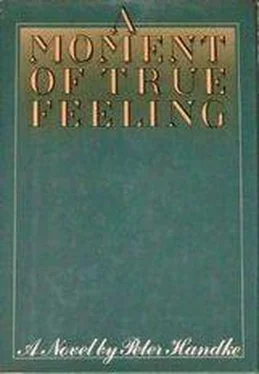The afternoon had been going on and on, and now time became acute, like an organ one doesn’t notice until it stops functioning. All at once there was so much of it that, instead of just passing, it took on an existence of its own. Everybody was affected; now no one could take refuge in activity; and almost with a sense of liberation Keuschnig reflected that at last he wasn’t alone in this predicament. What had previously been a mere organ of universal unity became independent, became something more than its functioning, and from then on nothing functioned. The day seemed to have grown too long, time was now a hostile element that threatened a somnolent civilization with catastrophe. It was as though everyday time were no longer in force, and as though this condensed, hostile time were meant for a human being only in the sense that a trap is “meant” for someone, and as though even an animal would be unable to smell it out. All at once time began to pass amid the buildings as though governed by an extra-human system, in a dimension different from the course of the streets or the riverbank parapet or the motion of construction cranes, different from the whirling of pigeon feathers falling from the roofs or of the seed capsules gliding between motorcars. It seemed to Keuschnig that this merciless, elemental time crawling along under the tall luminous sky had expelled all life from the world, that every manifestation of human beings had become a meaningless interlude. Some children were hopping about on a dance floor that had been knocked together for some long-past fete, and a few ridiculous leaflets that no longer meant anything to anyone were skittering this way and that. As though the sky now partook of an alien system, it became too high for the high towers of civilization in the foreground of the picture, and against the compact, menacing background the human landscape degenerated into a junkyard. The deep blue with which a time grown plethoric weighed on the world was the essential — the scattered leaflets down below, in which only fear of life or death could beguile him (or anyone else!) to find the slightest meaning, were a secondary, minor factor. Keuschnig saw the sky arching over the Place de la Concorde as something incongruous and hostile, plunging its edges down at the Place. The street lamps on the Pont des Invalides glowed black before his eyes, as after long staring at the cloudless heavens — a memory of a past fete. Unable to confront the great open square — no, not now! — he left the cab before it reached the Esplanade des Invalides and ran — to what safety? Suddenly, as he ran, a warm raindrop fell from the clear, dark sky and landed on the back of his hand … When, in the rue Fabert, Keuschnig saw the brass plate inscribed “Austrian EMBASSY,” he was able to “laugh again,” and back in his office, the moment a sheet of clean white paper emerged from the black roller of his typewriter, he had the feeling that things were back to normal … Only once did he cower and hold his ears, his heart pounding deep in his body, as though outside, beyond the sheltering walls, something had erupted, against which the best decorated embassy was powerless. Heaven help those who are now defenseless, he thought, yet at the same time he hoped that this state of affairs would go on, because in his present, apocalyptic mood he had no personal feeling of himself, or at any rate so little as to believe he shared it with all others. But what if he were mistaken? — That, Keuschnig thought, would be the end of a possibility, even if the apparently universal situation outside me were only my personal situation.
For some daysKeuschnig had been working on a report for the Foreign Ministry, entitled “The Image of Austria in French Television,” and subtitled “Austria, a Studio Film.” Some television films based on stories by Arthur Schnitzler had given him the idea. The characters in these films had appeared only in bare interiors; the closest thing to the outside world was the inside of a hansom cab. Keuschnig started his article by saying that the image of Austria put forward by these films was expressed in their sets. By this, he didn’t mean that typically Austrian objects figured in the sets; no, he meant that their very bareness seemed to express a view of Austria, that the characters moved in a setting that could have been anywhere. Austria was represented as a historyless no man’s land peopled by historyless Everymans, and to judge by these films, just that was specifically Austrian. When a character entered in a state of excitement, his exciting experience hadn’t occurred in any particular country but in the vestibule. Keuschnig now set out to prove that because the country never played a part and because the action was never inflected by so much as a passing glance at the landscape the characters seemed to RECITE their experiences (possibly after memorizing them in the vestibule) — MEMO-RIZ E D embraces, the MEMORIZED expressions of two lovers looking into each other’s eyes; MEMORIZED kisses — and that the films themselves … (now what exactly did he want to say?), that because the characters in these films.. (was it possible that he too wrote memorized sentences?) … were not really alive (what did that mean?), but … had only MEMORIZED WAYS OF SIMULATING LIFE … because, wrote Keuschnig, nothing can be experienced in or through a country whose only special characteristic is that it consists of a bare set … that consequently these films picture Austria as a country in which the only stories people could possibly tell were SERIALS, which they represented as the story of their own lives! (but in what country or under what system did people not tell each other mere serial stories as though relating their own experiences?) — and that therefore these films …
Suddenly Keuschnig forgot what he had wanted to prove, and was glad of it. He tore up the paper. Then he looked around for more papers to tear up. For a while it cheered him to crumple them, tear them up, and throw them away. It seemed like some sort of vengeance. He ransacked the office for things to throw away, lined them up in front of him, and threw them one by one, after an elaborate windup even if they were only light envelopes, into a wastepaper basket. He tore up the picture postcards sent him by vacationing colleagues, and threw them away too. — Actually I could prove the opposite by these same films, he thought. Only yesterday he would have tried to prove not only some point but also himself with a demonstration developing logically from sentence to sentence — now he preferred to go on reading the newspapers and treat himself to a painless afternoon. He even read the horoscopes, and felt himself growing more and more inconspicuous. Cozily irreproachable, he sat alone in the room, at most allowing himself an occasional glance through the window at the chestnut tree, among whose dark-green leaves the much-lighter-colored prickly nut husks were already in evidence. How right the newspapers were today — how he esteemed the commentators today for having opinions! Those people don’t think about themselves, he thought — why couldn’t he be like that? He was in the mood to underscore every line. In reading a story about “the sad lot of …” he felt that he ought to follow the example of this reporter, who had selflessly risen above his own lot, which, Keuschnig felt sure, was just as sad as that of … He was especially moved by the jokes. What courage one needed to think up a joke! How free from vanity one must be to look for the comical aspect of everything that happened to one — because there HAD TO be a joke in everything! “Have you heard this one: somebody dreams that he’s become a murderer?” “Yes, but where’s the joke?” Was humor the solution? — In any event, as Keuschnig read the evening papers in cozy inconspicuousness, he envied people in general their contempt for death.
Читать дальше












